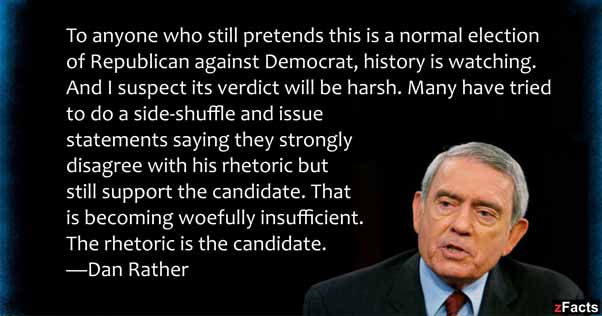What did Trump really mean? The media plays that guessing game every day. Then Trump changes his tune, and they guess again. Dan Rather is telling you how to see through Trump and avoid this trap. To understand Trump, understand Dan Rather’s punch line.
The rhetoric is the candidate.
There are two parts to a normal candidate: policy positions and rhetoric. Usually we care more about their policies. But Trump basically has no policy positions. He has sensational claims—”I will build a wall and Mexico will pay.” That’s just rhetoric, or as Trump says, just words. “I have the best words.” He is most proud of how he can get a crowd worked up with his words.
To Trump, it’s all about winning the game
Trump explains his strategy in his book, The Art of the Deal. “I’m the first to admit that I’m very competitive and that I’ll do nearly anything within legal bounds to win.” In a political campaign, “I’ll do nearly anything,” means “I’ll say anything.”
“He lied strategically. He had a complete lack of conscience about it.” —Tony Schwartz, ghost writer for The Art of the Deal. Not surprisingly, Politifact found that Trump’s “record on truth and accuracy is astonishingly poor.”
“One thing I’ve learned about the press,” says Trump, “is that they’re always hungry for a good story, and the more sensational the better.” You can’t get much more sensational than suggesting that Ted Cruz’s father was in on Kennedy’s assassination, or that Obama founded ISIS.
To Trump, “The real excitement is playing the game.” In this case, it’s a game of “run for president,” and he’ll say anything to win.
So when you try to figure out what Trump means, stop yourself right there. That’s what the press does, and it’s the wrong question. He doesn’t mean what he says. It’s all just manipulation. The right question is this: “why does he think that what he said will help him win?” Then remember his three guiding principles:
- He’ll say nearly anything to win.
- The press is always hungry for a sensational story.
- Even “bad publicity is sometimes better than no publicity at all.”
With those in mind, you should have no trouble understanding what he’s up to.
New York’s Mayor Bloomberg summed all this up beautifully: “I’m a New Yorker, and New Yorkers know a con when we see one.”
Trump is a con. The rhetoric is the candidate.
What others are saying
Barbara Bush, George H W’s wife: “I don’t know how women can vote for someone who said what he said about Megyn Kelly, it’s terrible.” Trump is “a comedian” and “a showman.”
Dan Gross, president of the Brady Campaign and Center to Prevent Gun Violence: “For Trump, violence has become a standard talking point, a common punch line, and even a campaign strategy.”
Ted Cruz: “He doesn’t know the difference between truth and lies.” Maybe not, but the real point is this: Trump doesn’t care. The difference doesn’t matter when all you care about is winning.
Marco Rubio: “A con artist is about to take over. … He is wholly unprepared to be president.” Asked about this as he endorsed Trump, Rubio said “I’ve stood by everything I ever said in my campaign.”
Trump is a con, and a con lives and dies by his “rhetoric.” His essence is winning, and he will say anything to win. To endorse him is to endorse the idea of electing a con to be president of the United States. “History is watching, and the verdict will be harsh.” —Dan Rather


